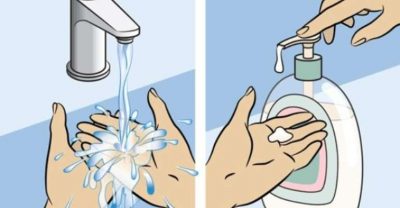The Leader of Risk Communication for COVID-19 Response, at the Ghana Health Service (GHS) Dr. Dacosta Aboagye, has cautioned that the use of alcohol-b
The Leader of Risk Communication for COVID-19 Response, at the Ghana Health Service (GHS) Dr. Dacosta Aboagye, has cautioned that the use of alcohol-based hand sanitizers is not a substitute for handwashing.
He has, therefore, urged the public to practice frequent hand washing with soap under running water to help contain the spread of the Delta variant.
The Delta variant of COVID-19, which was first detected in India has been called a variant of concern by the World Health Organization (WHO) because of its high transmissibility.
Where the Delta variant is identified, it quickly and efficiently spreads between people. As of 10 August, the Delta variant has been reported in 142 countries.
Although the delta variant is said to be highly contagious, about twice as contagious as previous variants, the same precautions, such as avoiding crowded spaces, keeping your distance from others, and mask wearing, still work against it.
Dr Aboagye said even though the GHS would normally encourage people to use alcohol based hand sanitizers, washing of hands with soap under running water is the preferred protocol.
He told the Ghana News Agency (GNA) that the Service had observed a significant drop in hand washing especially at public places and cautioned the public not to be weary of practicing the safety protocols, saying, ‘we must fight the COVID-19 safety protocols adherence fatigue to be able to fight the virus”.
Dr. Aboagye said the COVID-19 Delta variant was fast spreading in local communities, hence, enhanced adherence to the protocols together with the vaccination would ensure that all persons are safe.
Ghana first detected the Delta variant from passengers who arrived at the Kotoka International Airport in June of 2021. A community infection was detected in the same month after which about?136 Achimota senior high school students?tested positive for the Delta variant.
Presently, a total of 126,313 COVID-19 cases, with 1,142 deaths have been recorded in the country, presently, the active cases are 3,867.
The WHO says even with the emergence of the new Mu COVID-19 variant, the Delta strain remains the top concern globally, appearing to “outcompete” other variants.
Dr Aboagye said with fatigue growing amid the third wave, it was a perfect time to renew public communication, build on the swell of supportive messages from politicians, celebrities, and other people to correct misinformation that has crept into social media space.
The Health Promotion Director said handwashing has served Ghana well as no single case of Cholera has been recorded in the country since 2020, similarly, diarrhoea cases have reduced by 30 per cent within the same period.
Mrs Eunice Teah Dzagli, a Health Promotion Officer at the Greater Accra Regional Health Directorate said although hand sanitizers protect people, there is the need for people to wash their hands to rid of dirt’s and the chemicals in sanitizers.
“Handwashing at frequent intervals is better than using a sanitizer, because sanitizers protect us for just an hour and its frequent use puts so much pressure on the kidney,” she said.
Although there is no readily available data in Ghana on the number of persons washing their hands frequently and the number of people using hand sanitizers, as parts of the infection prevention measures, health experts have said that handwashing was one of the most effective ways to prevent the spread of viruses and germs.
The World Health Organization (WHO) says, the COVID-19 outbreak has overly emphasized the importance of handwashing with soap to reduce the spread of the virus.
It said hands are the main pathways of germ transmission during health care and hand hygiene is the most important measure to avoid the transmission of harmful germs and prevent health care-associated infections.
But checks by the Ghana News Agency at public places such as Makola -the central business district in Accra, lorry stations, banks, and some shops have revealed that handwashing among the public was relatively low.
The GNA observed that at instances where hand washing stations were available, the facilities were incomplete, some veronica buckets had no water, where there was water, there was no soap or tissue, and at some places, you will find just an empty veronica bucket.
Madam Victoria Annor, a shop owner at Makola who spoke to the GNA said she did not boarder to provide a functional hand washing station in front of her shop because most of her clients preferred to use their own hand sanitizers.
Hand washing also known as hand hygiene is the act of cleaning hands with soap under running water to remove dirts, viruses, bacteria, microorganisms, grease, or other harmful and unwanted substances stuck to the hands.
Drying of the washed hands is part of the process as wet and moist hands could be easily contaminated.
To practice proper hand washing, first, wet your hands with water and apply enough soap to create a good lather, rub your palms together, rub the back of your hands, scrub between your fingers, clean the back of your fingers, clean your thumbs, rub your palm with your fingertips, wash each wrist with the opposite hand and dry your hand with a clean tissue.
Ghana as at September 27th as reported on the Ghana Health Service COVID-19 page, has recorded 126 new cases, 3,154 active cases, 123,036 recoveries/discharge, and 1,152 deaths.
COMMENTS